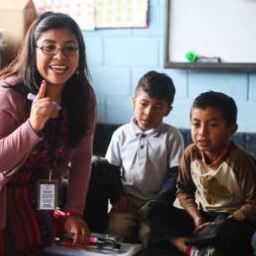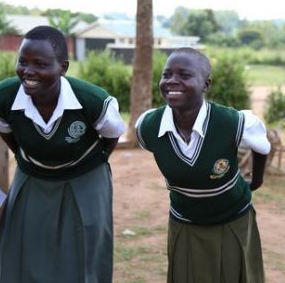The Magic of Mentoring
How can we really make a difference? Since its inception, Project Redwood’s mission has been to achieve measurable objectives in reducing the causes and effects of poverty.
Research has shown that one of the surest ways to help people lift themselves out of poverty is to educate them. For example, a 2015 study at Georgia Tech showed an overall 15.5% improvement in income-to-poverty ratio, averaged among several different US population groups. Worldwide, a 2017 UNESCO Global Education Monitoring Report indicates that nearly 60 million people could escape poverty if all adults had just two more years of schooling.
Furthermore, studies have shown that educating girls, who in poor countries often face particularly steep barriers to education can have a particularly powerful impact. According to the Global Monitoring Report, as of 2013, 2/3 of the 774 million illiterate people in the world were female. Educating girls can have huge impacts on all of society including the increased likelihood of educated women finding work, reduced maternal deaths and reduced child mortality
And yet many factors impede the poor from acquiring this education:
Cost of school fees
Poorly-staffed schools and inadequately trained teachers
Bias against educating girls
Three of Project Redwood’s sponsored projects have attacked the problem of poor education head-on, in different countries and with differing methodologies, but with one consistent feature: the importance of mentoring in achieving immediate goals and in making the results scalable for the future.
Child Aid

Child Aid is a project in Guatemala, founded in 1993 by Nancy Press and Rick Carol. Originally Child Aid worked to improve literacy by funding libraries. But they shortly realized that to achieve their goals it would be necessary to work directly with schools.
Their model improves the training of teachers by setting up a local organization that mentors teachers in a structured way. Child Aid recruits team leaders who in turn recruit supervisors, who mentor local Literacy Trainers (CTLs ). These CTLs train teachers to improve classroom performance along several measurements.
This model results in a cascade of mentoring that reaches from the sponsors of the program all the way to individual students. The efficacy of this approach shows in the results reported for the 2016 grant.
According to the report, “the increased involvement of our sponsor and Child Aid Board member Charlie Baum, has had a perceptible effect on the thinking of Child Aid’s CEO…” resulting in the development of business methods to structure planning for the future.
In turn, the US-national Country Director was able to mentor Guatemala-national senior staff. This program goal fostered both buy-in from the local staff and the goal of expansion and scale. Kindergarten teacher Ingrid Rosales Ordoñez says “I’ve learned so many new teaching styles” – including using a story map and miming and dramatization techniques – “and am so happy to receive the support and coaching provided.”
As of Child Aid’s Final Report for the 2016 grant, the organization’s impact has grown to have 710 trained teachers on the ground, from 477 in 2015, and successfully teaching 16,330 students compared to 8751 in 2015. In other words, the impact of the mentoring approach has resulted in an 86% increase in students taught, accomplished with only a 49% increase in available teachers.
Cristo Rey
 Cristo Rey is a network of private, Catholic secondary schools focusing on providing college-prep education to students whose families would not be able to afford this education otherwise. Cristo Rey has developed a unique Corporate Work Study Program as a sustainable way to help fund its mission.
Cristo Rey is a network of private, Catholic secondary schools focusing on providing college-prep education to students whose families would not be able to afford this education otherwise. Cristo Rey has developed a unique Corporate Work Study Program as a sustainable way to help fund its mission.
In the program, students develop a strong work ethic, build leadership skills, and gain exposure to career options. They are readied for college and the workforce, and thus will help pull their families up out of poverty. The compensation for the students’ work in the corporate world is used to pay the tuition and fees that their families would otherwise be unable to afford.
Project Redwood’s 2015 involvement, led by sponsors Rick Agresta and Rich Jerdonek, originally focused on 3 students working below grade level, with social and behavioral problems that made it difficult to place them in paying jobs. The grant from Project Redwood covered the gap in tuition while these students pursued non-paying, non-profit jobs. In fact, the grant was large enough to allow 10 additional students to stay at Cristo Rey and receive the mentoring they needed from school staff, including the school psychologist, the school counselor, and the Dean of Learning and Support.
In addition, many received one-on-one on-site training not only in technical job-related skills but also in communication and business etiquette skills. Thus, they were able to progress to paying jobs, high school graduation, and eventual acceptance at college.
Mentoring can also take the form of exposure to positive role models, and the 2015 class met just such a person when Deo Niyizonkiza, of Village Health works, spoke to them after they had read Tracy Kidder’s biography of him, The Strength in What Remains. Deo is a former refugee from Burundi whose trajectory, from homelessness to medical school, then on to found Village Health Works, showed the students by example what can be possible for them as well.
One Cristo Rey success story is a young woman named Adonia, who came to Cristo Rey with a number of undiagnosed learning disabilities. At her unpaid placement at Marble Collegiate Church, supported by the Project Redwood grant, she struggled with memory retention and information processing. Her mentor, Daphne, helped Adonia create a system to break down large tasks into smaller jobs, and to stick to a structured schedule. She has become an effective and independent worker, now able to successfully transition from one job to the next.
Educate!
 Ann Gordon McStay sponsored Educate! in 2011 through 2013. The Educate! Experience is a two-year program comprising entrepreneurship and leadership training, intensive mentorship and experience starting and running an enterprise. The goal of these enterprises is that 50% of students will have a business and self-report making at least $40 a month.
Ann Gordon McStay sponsored Educate! in 2011 through 2013. The Educate! Experience is a two-year program comprising entrepreneurship and leadership training, intensive mentorship and experience starting and running an enterprise. The goal of these enterprises is that 50% of students will have a business and self-report making at least $40 a month.
Project Redwood’s grant supported implementing the program in five new schools and working with 150 new scholars. In fact, Educate! exceeded these goals by adding a total of 150 schools, ultimately reaching over 20,000 youth in 2014.
At the student level, the results of the 2016 grant report a 160% increase in average income, with 94% of graduates either run a business, hold a job, or attend university.
An Educate! Mentor delivers training, mentorship, and student business support through weekly lessons at partner schools. Mentors are from the local community and have practical experience running small business or community projects. They are trained to use a specific mentoring approach to facilitate skill-building experiences for their Scholars.
In addition to delivering an 80-minute lesson in leadership, entrepreneurship and workforce readiness, they mentor participants through challenges such as the tendency for relatives to take over the businesses and lack of access to capital. Scholars being mentored are encouraged to mentor 3 lower-secondary students as well.
Another part of the Educate! Experience is the formation of Student Business Clubs, entrepreneurial platforms that teach business and employability skills and encourage students to start businesses as a team.
This emphasis on mentoring has meant that demand for Mentors is growing rapidly, including:
- Building a bench of qualified mentors in case of high turnover
- Setting stipends that align with alternative opportunities
- Selecting graduates of the program who are familiar with Educate! concepts
- Running training residentially so that mentor training staff can spend time outside formal training sessions to provide extra support
- Increasing monitoring of Mentors for on-site training.
Educate! shows that mentoring works by implementing innovative technologies to cost-effectively manage and monitor their programs across great distances. Randomized controlled trial results show an
 One Educate! success story is Joan, already an entrepreneur with a small jewelry business when she joined the program. Working with Educate! inspired her to start a new business, a toilet paper enterprise, motivated by her frustrations of seeing used paper burned in trash piles as well as her concern for the school dropouts in her community. Using the skills she learned through Educate!, Joan mentored the young dropouts to collect scraps and sell them to the recycled paper company, who turns the scrap into toilet paper that Joan sells to local shops. Joan says, “Educate! has given me the ability to think big and know where to go from here.”
One Educate! success story is Joan, already an entrepreneur with a small jewelry business when she joined the program. Working with Educate! inspired her to start a new business, a toilet paper enterprise, motivated by her frustrations of seeing used paper burned in trash piles as well as her concern for the school dropouts in her community. Using the skills she learned through Educate!, Joan mentored the young dropouts to collect scraps and sell them to the recycled paper company, who turns the scrap into toilet paper that Joan sells to local shops. Joan says, “Educate! has given me the ability to think big and know where to go from here.”
,